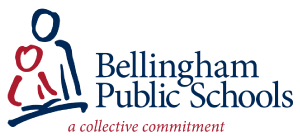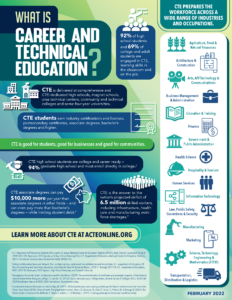What is CTE?Ã˝Today‚Äôs cutting-edge, rigorous and relevant career and technical education (CTE) prepares youth and adults for a wide range of high-wage, high-skill, high-demand careers. CTE emphasizes real world, real life skills to connect students to academics and training that will help them be successful in their chosen career.
- Practical Skill Development: Emphasizes hands-on learning that equips students with practical skills applicable to specific career pathways.
- Industry-Relevant Training: Programs are designed in collaboration with industry professionals and employers to ensure that students acquire the latest skills and knowledge required in the workforce, bridging the gap between education and industry demands.
- Diverse Career Pathways: A wide range of career pathways to accommodate diverse student interests and talents.
- Work-Based Learning Opportunities: Integrated work-based learning experiences allow students to gain real-world exposure and build valuable networks within their chosen industries.
- Post-Secondary Readiness: Programs prepare students for both immediate employment and further education that enhance their competitiveness in the job market and facilitate transitions to post-secondary institutions.
Leadership skill development for all students is also an integral part of CTE programs. Students participate in leadership activities through Career and Technical student organizations such as , , , , , or locally developed technical clubs. Work-based learning activities are also available to extend the classroom into the workplace, connecting acquired knowledge and skills to a student‘s future employment.
Juniors and seniors have the opportunity to enroll in specialized CTE programs through a partnership with the . In addition, many CTE courses provide an opportunity for students to earn both high school and college credit through the dual credit program.
Options High School
Agriculture Sciences focus on the essential elements of life food, water, land, and air. This career cluster includes a diverse spectrum of occupations, ranging from farmer, rancher, and veterinarian to geologist, land conservationist, and florist. It also includes non traditional agricultural occupations like wind energy, solar energy, and oil and gas production.
Business & Marketing focuses on building linkages in IT occupations for entry level, technical, and professional careers related to the design, development, support, and management of hardware, software, multimedia, and systems integration services.
Family & Consumer Sciences focus on the management, marketing, and operations of restaurants and other food/beverage services, lodging, attractions, recreation events, and travel-related services. Students acquire knowledge and skills focusing on communication, time management, and customer service that meet industry standards. Students will explore the history of the hospitality and tourism industry and examine characteristics needed for success.
Health Sciences focus on planning, managing, and providing therapeutic services, diagnostics services, health informatics, support services, and biotechnology research and development. To pursue a career in the health science industry, students should learn to reason, think critically, make decisions, solve problems, communicate effectively, and work well with others.
Skilled & Technical Sciences are about using your skills in design, planning and management to work in careers building and maintaining structures such as buildings, homes, bridges, or machinery. Work opportunities include developing new structures, restorations, additions, alterations, and repairs.
STEM studies and applies principles from advanced mathematics, life sciences, earth The Science, Technology, Engineering, and Mathematics (STEM) Career Cluster® focuses on planning, managing, and providing scientific research and professional and technical services, including laboratory and testing services, and research and development services. and space science, and technology. In addition, future engineers and technologists learn certain processes in mathematics, science and technology.
Students can meet Graduation Pathway requirements by completing a CTE course sequence and selecting the CTE Pathway in their High School and Beyond Plan. To meet graduation requirements, the CTE course sequence must be 1) approved by OSPI; 2) earn at least 2.0 high school credits in one program area; and 3) include a course that is either a dual credit course (*T) or would lead to an industry-recognized credential (IRC).


